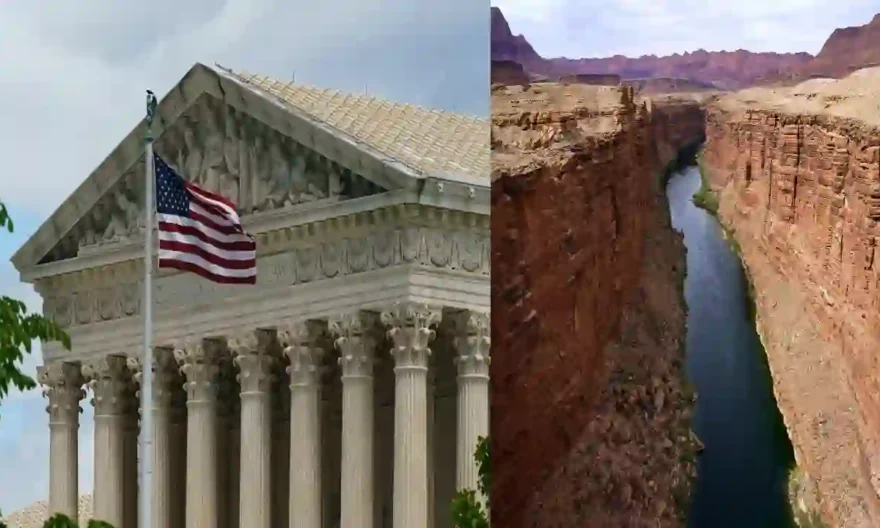
In a 5-4 ruling the Supreme Court of USA has recently delivered a verdict against the Navajo Nation in a water dispute involving the drought-stricken Colorado River.
The states of Arizona, Nevada, Colorado, and California’s water districts, who draw water from the river, urged the court to rule in their favor, arguing that a decision favoring the Navajo Nation would disrupt existing agreements and the river’s management.
The Biden administration expressed concerns that a ruling in favor of the Navajo Nation could open the door to lawsuits from other tribes against the federal government.
The Navajo Nation’s lawyers had presented their request as modest, simply seeking an assessment of the tribe’s water needs and the development of a plan to meet them.
The case traces back to treaties signed between the tribe and the federal government in 1849 and 1868. The second treaty designated the reservation as the tribe’s “permanent home,” with the Navajo Nation asserting that this promise includes a sufficient water supply. In 2003, the tribe filed a lawsuit against the federal government, arguing that it had neglected to consider or protect the Navajo Nation’s water rights to the lower portion of the Colorado River.
In a majority opinion authored by Justice Brett Kavanaugh, who was joined by other conservative justices, it was explained that “the Navajos contend that the treaty requires the United States to take affirmative steps to secure water for the Navajos — for example, by assessing the Tribe’s water needs, developing a plan to secure the needed water, and potentially building pipelines, pumps, wells, or other water infrastructure.”
However, Kavanaugh clarified, “In light of the treaty’s text and history, we conclude that the treaty does not require the United States to take those affirmative steps.”
Kavanaugh acknowledged the complexities surrounding water issues, particularly in arid regions of the American West. He emphasized, “Allocating water in the arid regions of the American West is often a zero-sum situation,” he wrote. It is important, he said, for courts to leave “to Congress and the President the responsibility to enact appropriations laws and to otherwise update federal law as they see fit in light of the competing contemporary needs for water.”
Initially, a federal trial court dismissed the lawsuit, but an appeals court allowed it to proceed. The Supreme Court’s decision now overturns the appeals court’s ruling.
In a dissenting opinion, Justice Neil Gorsuch expressed his disagreement and would have allowed the case to proceed. He characterized the Navajo Nation’s position as a “simple ask” and questioned, “Where do the Navajo go from here?. To date, their efforts to find out what water rights the United States holds for them have produced an experience familiar to any American who has spent time at the Department of Motor Vehicles. The Navajo have waited patiently for someone, anyone, to help them, only to be told (repeatedly) that they have been standing in the wrong line and must try another.”
However, Gorsuch found a potential “silver lining” in the majority’s recognition that the tribe could still “assert the interests they claim in water rights litigation, including by seeking to intervene in cases that affect their claimed interests.”
Gorsuch, known for his conservative stance and being a native of Colorado, has emerged as a supporter of Native rights since joining the court in 2017. His dissenting opinion was joined by the three liberal justices: Sonia Sotomayor, Elena Kagan, and Ketanji Brown Jackson.
During the arguments presented in March, Justice Samuel Alito noted the geographical distance between the Navajo Nation’s original reservation and the specific section of the Colorado River from which they now seek water.
Presently, the Colorado River runs along the northwestern border of the Navajo Nation’s reservation, extending into New Mexico, Utah, and Arizona. The reservation is also traversed by two of the river’s tributaries, the San Juan River and the Little Colorado River. However, despite these water sources, approximately ⅓ of the reservation’s population, which amounts to about 175,000 people, lacks access to running water in their homes.
The government contended that it has assisted the tribe in obtaining water from the Colorado River’s tributaries and provided financial support for infrastructure projects such as pipelines, pumping plants, and water treatment facilities. However, it argued that no law or treaty obligated the government to assess and address the tribe’s overall water needs. The states involved in the case maintained that the Navajo Nation was attempting to bypass a Supreme Court decree that allocated water in the Lower Basin of the Colorado River.
Navajo Nation President Buu Nygren expressed disappointment in the ruling and stated that the tribe’s lawyers “continue to analyze the opinion and determine what it means for this particular lawsuit.” Nygren emphasized “My job as the President of the Navajo Nation is to represent and protect the Navajo people, our land, and our future. The only way to do that is with secure, quantified water rights to the Lower Basin of the Colorado River.”
Rita McGuire, an attorney representing the states opposing the tribe’s claims, expressed satisfaction with the court’s decision, describing it as correct and stating that they are “very pleased” with the outcome.




